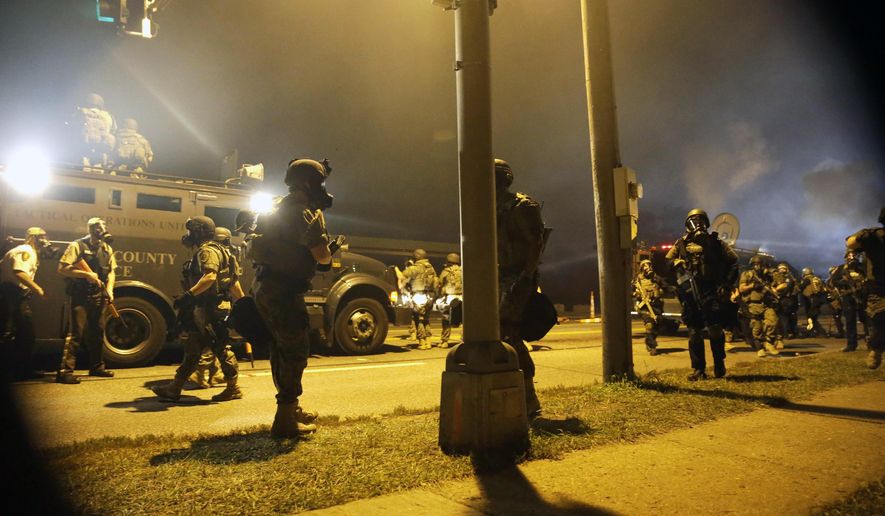Critics are assailing Missouri Gov. Jay Nixon’s decision to deploy armed National Guard troops to Ferguson — for the looming grand jury decision of whether to indict Officer Darren Wilson in the shooting death of unarmed Michael Brown — as an act of provocation.
“This is why it’s a really bad idea. It’s almost egging them on, telling protesters before hand that troops will be there,” said Trevor Burrus, a research fellow at the CATO institute. “If this comes down with no charges, they are going to feel a double injustice against them.”
Protesters are already planning to shut down roads in Clayton following the jury’s decision, and are hoping to attract more people from outside of Ferguson to participate in civil disobedience.
Since 2001, the National Guard has been deployed in Missouri 32 times.
Although the Guard is normally used for natural disaster relief, it is not uncommon for a governor to deploy troops for crowd control, but such cases have led to disaster in the past, most famously the shooting of several students at Kent State University in Ohio in May 1970.
In 1992, President George H.W. Bush federalized all 10,000 National Guard troops to control rioting an looting in Los Angeles following the release of a videotape showing two white police officers beating a black man, Rodney King. Over the next six days, 53 people were killed and over 2,000 injured in the “Rodney King riots.”
This is the second time that the National Guard has been sent to assist local police in Ferguson following the shooting of Michael Brown by Officer Darren Wilson.
Mr. Burrus warned that when troops march in with an expectation that protesting will become violent, it almost certainly will turn ugly in response to law enforcement behavior.
“People are increasingly realizing that its the response of the police officers that creates the crowd atmosphere,” he said, arguing that by focusing on protecting police rather than citizens, the National Guard would only antagonize protesters that are already feeling threatened by law enforcement.
“The paramount concern has become officer safety, not to protect and serve the community,” Mr. Burrus said, adding that it would be counterproductive to use a military force to combat rioters who are protesting police militarization.
“The way you address a crowd in Fallujah should be very different than the way you address a crowd in Ferguson. But that’s not necessarily the case,” Mr. Burrus added.
But John Malcolm, director at the Edwin Meese III Center for Legal and Judicial Studies, argued that the use of military equipment was more problematic than the presence of military troops in Ferguson.
He speculated that if National Guard troops were to come in to Ferguson with riot gear and heavy machinery before the need for such hardware arises it would take a potentially inflammatory situation and turn it in to a time bomb.
“But having people who have faced real danger and can act more appropriately in a measured response is not a bad thing,” Mr. Malcolm added.
Gov. Jay Nixon also declared a state of emergency on Monday but gave no indication of how many troops would be headed for Ferguson or when the grand jury’s decision would be announced.
“My hope and expectation is that peace will prevail,” Mr. Nixon said, according to the Associated Press. “But we have a responsibility – I have a responsibility – to plan for any contingencies that might arise.”
National Guard troops will not be posted at the front lines, but will be used in a secondary role to support the Highway Patrol and to “protect life and property,” Mr. Nixon said.
“The way we view this, the Guard is not going to be confronting the protesters and will not be on the front line interacting directly with demonstrators,” St. Louis Mayor Francis Slay told the Associated Press.
“If that’s the case, if the guard is never used in that regard, they should be commended,” Mr. Burrus said.
Mr. Malcolm added that, while he hoped cooler heads prevailed, it was wise to keep the National Guard on alert.
“I think the danger of not preparing in this kind of way would be greater than the danger of being prepared in this kind of way.”
• Kellan Howell can be reached at khowell@washingtontimes.com.




Please read our comment policy before commenting.